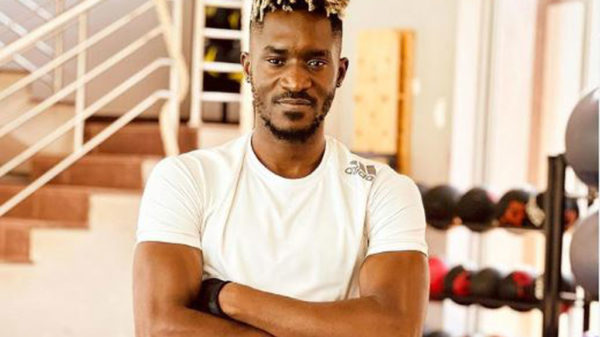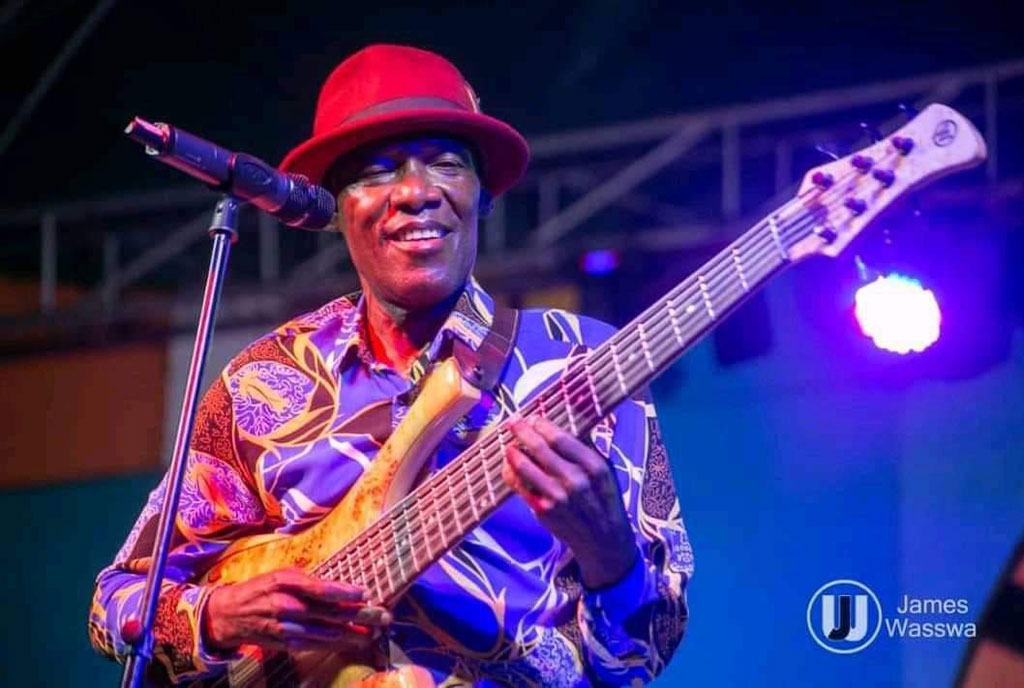GUITAR MAESTRO: Kasule was highly regarded by Kenyans, Tanzanians and Congolese musicians but, in a way, remained on the footnotes of local music bibliography, writes Jacobs O. Seaman.
Mopepe. That is what Kenyans called Sammy Kasule – a man of air. They said he was Uganda’s only musician. No disrespect to the Chameleones of the country but Kasule played the music that touched their hearts.
On Tuesday evening, news of Sammy Kasule’s death left many sad across the eastern borders. They can still hear him praise his Kenyan wife and mother of his two sons in Marie Wandaka, they can hear him give sombre advice on righteous living in Uzima, they can hear him croon in “Kukupenda” love ballad, in “Ndoto”, in “Ushirikiano”…
Yet in his motherland, the old saying that death is a merchant wafted like mopepe in many people’s faces as they sought to know who Sammy Kasule was. “Ooh, the man behind “Oze Munange” and “Ekitobero”? RIP,” they sighed.
Kasule was highly regarded by Kenyans, Tanzanians and Congolese musicians but, in a way, remained on the footnotes of local music bibliography despite an illustrious music career that saw him play with some of the greatest musicians to grace the land.
Kasule breathed his last in Amsterdam, the Netherlands, on Tuesday afternoon where he had been admitted to hospital as an emergency during a stopover en route to Sweden.
He had lived in Sweden for years with his family and when ill-health struck, he found it best to travel back to his third home for treatment and be with his family. He was 69.
The man and his six-string guitar
One of the most endearing images of Kasule was of him strapping and plucking from a unique six-string bass guitar.
The commonest bass guitars are four-stringed followed by those with five. By the time you are able to play effortlessly on the six-string guitar, you should be a maestro of the instrument. Kasule was certainly a gifted bassist and arguably the best the country has ever had on the instrument, but he was also a prolific composer and vocalist.
This was a man who knew what he wanted at a tender age of 10 and pursued it with unyielding desire — a gold disk award from CBS Records International, a reward and proof of selling a considerable volume of music on the world scene, a confirmation of a journey dreamt and walked.
Three years ago when I sought an interview with Kasule, a couple of fellows noted that he was difficult to approach, while a veteran journalist said off-record that the late musician was “arrogant.”
But for a man who had to prove himself on the strings by pulling off renditions of one of the greatest guitarists Africa has produced in Franco Luambo Makiadi and become a bassist in the famous Vipers Band that was dominated by Congolese musicians, Kasule was within every right to have airs — as he would call it.
However, there is no denying that that face of Kasule is difficult to see even in the cleanest mirror. A look at his Mopepe (Lingala for wind or air) moniker is one clue. Air was the one word that defined him most. He loved to cite air and was aptly named one.
He would say he has no airs to mean he is easy-going and not sentimental about his celebrity status. In the song “Malako” by Orchestra Les Kinois, Samba Mapangala would call out to him, “Kasule eh Mopepe eh sitaki maneno oh sitaki ah.”
“I am just another musician. A simple guy who loves music and likes to play,” he described himself in an interview with Daily Monitor two years ago.
Frank Mbalire, Kasule’s long time comrade on the strings and bandmate, described him as a down-to-earth person, gentle and kind.
“He is one person who will take off a shirt and give it to a person,” Mbalire told Daily Monitor. “He doesn’t like to see people suffering.”
Musician David Pragmo said Kasule was a musical father figure to him and many other musicians.
“I met and produced music with him at Jason’s 3 In One Studio working together with Frank Mbalire,” he said. “He was very humane, gentle, kind and very understanding to work with. He was a gifted bass player! Uganda has once again lost a library of musical preservation.”
Determined from the start
Sammy Kasule was born to Merekizadeki Kibirige and Catherine Namuwenda in Kampala in 1952. His foray into music took a striking resemblance to that of Franco. Both made their first guitar themselves from rudimentary items, Kasule improvising with wood and a fuel can.
And both attracted the ire of their mothers who did not see music as a career worth pursuing, considering it a vocation for the riff-raff. Kasule had at least two of his hand-made guitars destroyed by his mother with some good beatings to go with before he finally got away with it.
Although the comparisons go east and west when it comes to musical greatness, Kasule did find his own fort in bass guitar, where his mastery of the six-string instrument earned him great admiration.
His inspiration came from listening to Congolese music played on radio, and Ugandan musicians Christopher Ssebaduka and Rosia Nyogo from whom he learnt the “Ekitoobero” song.
After his formative education at Kibuli Primary School, his family relocated to Masuuliita and he was enrolled at Light College Katikamu. He was in the school band with one eye on the bigger musical chords that played notes in his mind. It did not take long for Kasule to abandon school before finishing O-Level as the music ‘demons’ took control and demanded he pursue his career rather than try to ‘Find X’ in the classroom.
With Congolese Soukous and Ugandan folk shaping his idea of what good music should be like, he blended the two with uplifting rhythms, taking with him his conceptions to Kawumba band, based at New Life bar in Mengo, in 1969.
However, his musical journey hit a thick political cloud thrust by President Idi Amin’s government, forcing Kasule to flee the country into neighbouring Kenya where he joined a Congolese, Les Noirs, in 1973. Les Noirs was among the first multinational bands to be based in Mombasa from the 1960s.
This was the era of the influx of Congolese musicians into East Africa, including Baba Nationale led by Baba Ilunga wa Ilunga (Gaston), Super Mazembe, Les Kinois and later Orch Virunga.
Nairobi provided a major attraction in its superior recording studios but there was no place for music recorded in Luganda or English here so Kasule had to learn Kiswahili and Lingala, the two languages his audiences spoke. By 1977, he was ready to rock it and recorded his first single, “Maria Wandaka”, which received great airplay in Kenya. He followed it up with a “Shauri Yako” English version and then “Ekitoobero”.
In 1979, Kasule met Philly Bongoley Lutaaya, who would later help him move to Sweden in the 1980s from where they teamed up with other Ugandan musicians such as Mbalire, Hope Mukasa, Joseph Nsubuga, Richard Mudungu, Fred Ssemwogerere and Shem Makanga to form a group called Savanna.
That is when they released Lutaaya’s “Born in Africa” album.
However, Sweden could only support his career but not sell him well musically. Kasule would always belong to Uganda even if Kenya was his second home and where he was most famous.
In 2014, the former Afrigo Band musician returned home and would team up with long-time friend Mbalire to start Ziwuuna Band. The man who had made forming bands a lifestyle in Kenya had told the media on his return that he would not form another again, but instead migrate his fully-equipped recording studio from Sweden to Kampala.
However, fate had its own ideas and Kasule, who had said he would be playing with Afrigo Band, is said to have fallen out with Moses Matovu. Neither was ever willing to discuss the details of the alleged fallout, instead opting to respect each other with silence about the matter. For Kasule, to his grave.
Kasule is survived by wife Marie and two sons; Sammy Kasule Jr, 35, and 25-year-old Mitchell Kasule.
At a glance…
Other bands in Kenya
While in Kenya, Kasule was at the forefront in the formation of the Somajeko International Band alongside Eliud Adonga, Shaban Onyango, Ali Magobeni and Festus Okonda.
In 1978, he was among the founders of the Makonde Band in Nairobi that was led by Greece-born Taso Stephanou.
In 1979, they toured London and performed with Cameroonian saxophone maestro Manu Dibango. On return to Kenya, he teamed up with Ali Magobeni, Vincent Otieno and Shaban Onyango to form the Jambo Talents Band.
In 1985, he co-founded Orchestra Vundumuna Band, which was based at the Carnivore Restaurant in Nairobi. Its members included Mofranck, Tabu Ngongo, Frantal Tabu, Kelly Kanku and Nsilu wa Basilu “Manitsho”.
Don’t want to miss out on any story? For updates on all Sqoop stories, follow this link on Telegram: https://t.me/Sqoop




























































